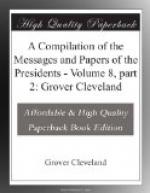I therefore now communicate the instructions given to our minister resident at London and his communications with that Government on the subject of the Chesapeake, with the correspondence which has taken place here between the Secretary of State and Mr. Rose, the special minister charged with the adjustment of that difference; the instructions to our ministers for the formation of a treaty; their correspondence with the British commissioners and with their own Government on that subject; the treaty itself and written declaration of the British commissioners accompanying it, and the instructions given by us for resuming the negotiation, with the proceedings and correspondence subsequent thereto. To these I have added a letter lately addressed to the Secretary of State from one of our late ministers, which, though not strictly written in an official character, I think it my duty to communicate, in order that his views of the proposed treaty and of its several articles may be fairly presented and understood.
Although I have heretofore and from time to time made such communications to Congress as to keep them possessed of a general and just view of the proceedings and dispositions of the Government of France toward this country, yet in our present critical situation, when we find that no conduct on our part, however impartial and friendly, has been sufficient to insure from either belligerent a just respect for our rights, I am desirous that nothing shall be omitted on my part which may add to your information on this subject or contribute to the correctness of the views which should be formed. The papers which for these reasons I now lay before you embrace all the communications, official or verbal, from the French Government respecting the general relations between the two countries which have been transmitted through our minister there, or through any other accredited channel, since the last session of Congress, to which time all information of the same kind had from time to time been given them. Some of these papers have already been submitted to Congress, but it is thought better to offer them again in order that the chain of communications of which they make a part may be presented unbroken.
When, on the 26th of February, I communicated to both Houses the letter of General Armstrong to M. Champagny, I desired it might not be published because of the tendency of that practice to restrain injuriously the freedom of our foreign correspondence. But perceiving that this caution, proceeding purely from a regard to the public good, has furnished occasion for disseminating unfounded suspicions and insinuations, I am induced to believe that the good which will now result from its publication, by confirming the confidence and union of our fellow-citizens, will more than countervail the ordinary objection to such publications. It is my wish, therefore, that it may be now published.




